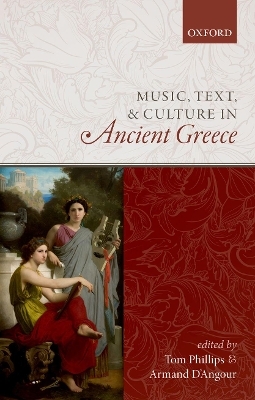
Music, Text, and Culture in Ancient Greece
Oxford University Press (Verlag)
978-0-19-879446-2 (ISBN)
What difference does music make to performance poetry, and how did the ancients themselves understand this relationship? Although scholars have long recognized the importance of music to ancient performance culture, little has been written on the specific effects that musical accompaniment, and features such as rhythmical structure and melody, would have created in individual poems.
This volume attempts to answer these questions by exploring more fully the relationship between music and language in the poetry of ancient Greece. Arranged into two parts, the essays in the first half engage closely with the evidential and interpretative challenges posed by the interaction of ancient music and poetry, and propose original readings of a range of texts by authors such as Homer, Pindar, and Euripides, as well as later poets such as Seikilos and Mesomedes. While they emphasize different formal features, they also argue collectively for a two-way relationship between music and language: attention to the musical features of poetic texts, insofar as we can reconstruct them, enables us to better understand not only their effects on audiences, but also the various ways in which they project and structure meaning.
In the second part, the focus shifts to ancient attempts to conceptualize interactions between words and music; the essays in this section analyse the contested place that music occupied in the works of Plato, Aristotle, Plutarch, and other critical writers of the Hellenistic and Imperial periods. Thinking about music is shown to influence other domains of intellectual life, such as literary criticism, and to be vitally informed by ethical concerns. These essays illustrate the importance of music for intellectual culture in ancient Greece and the ancients' abiding concern to understand and control its effects on human behaviour.
Tom Phillips is a Supernumerary Fellow at Merton College, Oxford, having previously held a Junior Research Fellowship at the college from 2013-16. He is currently working on the Leverhulme-funded project 'Anachronism and Antiquity', and his research focuses on archaic and classical lyric, Hellenistic poetry, and ancient scholarly culture. His first book, Pindar's Library: Performance Poetry and Material Texts (Oxford University Press, 2016) deals with the reception of Pindar in the Hellenistic period. Armand D'Angour is Associate Professor in Classical Languages and Literature at the University of Oxford and has been a Fellow and Tutor in Classics at Jesus College since 2000. He is the author of numerous articles on Greek and Latin literature and on ancient Greek music, as well as the monograph The Greeks and the New: Novelty in Ancient Greek Imagination and Experience (Cambridge University Press, 2011). He is a composer of verse in Latin and Greek, including commissioned Odes for the Athens Olympics in 2004 and the London Olympics in 2012.
Frontmatter
List of Figures
List of Abbreviations
List of Contributors
0: Tom Phillips: Introduction: Music, Text, and Culture
I: Interpretation
1: John C. Franklin: Epicentric Tonality and the Greek Lyric Tradition
2: Armand D'Angour: The Musical Setting of Ancient Greek Texts
3: Tom Phillips: Words and the Musician: Pindar's Dactylo-Epitrites
4: Oliver Thomas: Music in Euripides' Medea
5: Stelios Psaroudakes: Mesomedes' Hymn to the Sun: The Precipitation of Logos in the Melos
II: Theory, Reception, Contexts
6: Naomi Weiss: Hearing the Syrinx in Euripidean Tragedy
7: Anastasia-Erasmia Peponi: Lyric Atmospheres: Plato and Mimetic Evanescence
8: Pierre Destrée: Aristotle on Music for Leisure
9: James I. Porter: Sounds You Cannot Hear: Cicero and the Tradition of Sublime Criticism
10: Andrew Barker: Disreputable Music: A Performance, a Defence, and their Intertextual and Intermedial Resonances (Plutarch Quaest. conv. 704c4-705b6)
Endmatter
Bibliography
Index
| Erscheinungsdatum | 17.04.2018 |
|---|---|
| Zusatzinfo | 6 black-and-white figures |
| Verlagsort | Oxford |
| Sprache | englisch |
| Maße | 148 x 219 mm |
| Gewicht | 498 g |
| Themenwelt | Kunst / Musik / Theater ► Kunstgeschichte / Kunststile |
| Kunst / Musik / Theater ► Musik | |
| Geschichte ► Allgemeine Geschichte ► Vor- und Frühgeschichte | |
| Geisteswissenschaften ► Philosophie ► Philosophie Altertum / Antike | |
| Geisteswissenschaften ► Sprach- / Literaturwissenschaft ► Anglistik / Amerikanistik | |
| Geisteswissenschaften ► Sprach- / Literaturwissenschaft ► Literaturwissenschaft | |
| ISBN-10 | 0-19-879446-0 / 0198794460 |
| ISBN-13 | 978-0-19-879446-2 / 9780198794462 |
| Zustand | Neuware |
| Haben Sie eine Frage zum Produkt? |
aus dem Bereich


